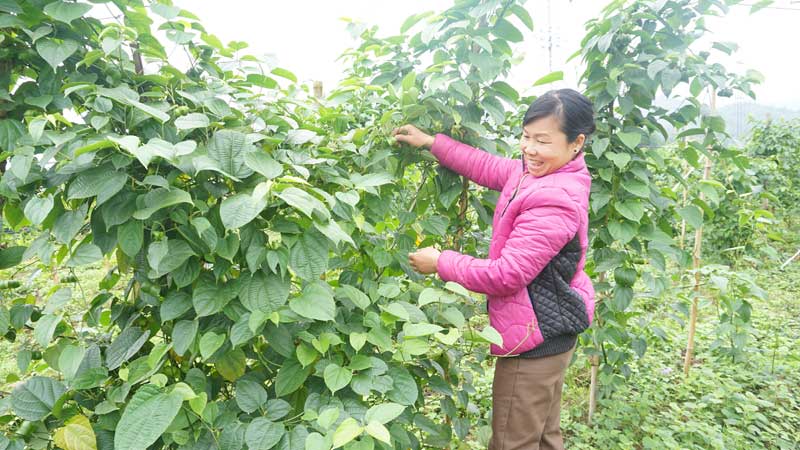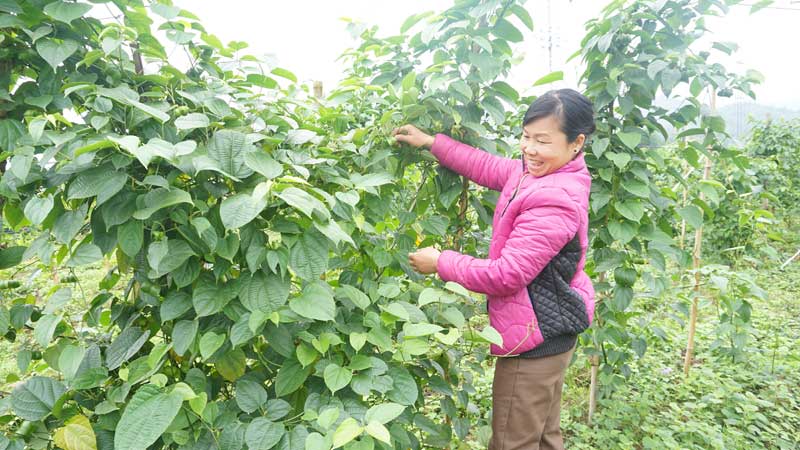
(HBO) – Hoa Binh province is embarking on a project on zoning off areas for medicinal plants, with priority given to the development of medicinal species with great competitive edges thanks to adaptation to cool climate, gradually meeting domestic demand and exports.
The sachi tree growing
project – a joint work between Inca Vietnam JSC and farmers in 10 provinces and
city – is lauded for its higher economic efficiency than other plants. The company’s
material area has covered 100ha, including 50ha currently under harvest. As a
plant with many uses, sachi has contributed to creating jobs and increasing
rural workers’ income.

Photo: A farmer in Dan Ha
commune, Ky Son district cares for sachi tree
Under a master plan on
medicinal plants till 2025, 24 species of the locality’s strength will be grown
on a site of 2,815ha, costing more than 1.2 trillion VND. Of which, over 415
billion VND will be from the State budget and the remaining from businesses and
people. The capital will help upgrade infrastructure, adopt technological
advances, agricultural encouragement, training, cultivation, trade promotion
and manage the quality of material areas.
Once the master plan is
launched, it is expected that medicine supply to the market will increase by
10-12 times from the current volume, thus meeting demand for medicines and
improving consumers’ health. Nearly 16,000 regular jobs are expected to be created
in the locality, contributing to improving local lives in zoned-off areas.
The stable and long-term
development of medicinal plant areas will help improve economic value on cultivated
area, creating more jobs and improving workers’ income as well as protecting
health of producers, consumers and ecological environment./.
According to data from the Hoa Binh Provincial Party Committee, the industrial production index for the first six months of 2025 is estimated to have increased by 20% compared to the same period last year. This marks the highest year-on-year growth rate for this period since 2020.
In the first six months of 2025, Hoa Binh province’s export turnover was estimated at 1.145 billion USD, marking an 18.11% increase compared to the same period in 2024. Import turnover was estimated at $ 804 million, a 17.15% increase, which helped the province maintain a positive trade balance.
The lives of the ethnic minority farmers in Tan Lac district have gradually improved thanks to the new directions in agricultural production. This is a testament to the collective strength fostered through the professional associations and groups implemented by various levels of the district’s Farmers’ Union.
With the motto the "product quality comes first,” after nearly one year of establishment and operation, Muong village’s Clean Food Agricultural and Commercial Cooperative, located in Cau Hamlet, Hung Son Commune (Kim Boi district), has launched reputable, high-quality agricultural products to the market that are well-received by consumers. The products such as Muong village’s pork sausage, salt-cured chicken, and salt-cured pork hocks have gradually carved out a place in the market and they are on the path to obtaining the OCOP certification.
In the past, the phrase "bumper harvest, rock-bottom prices" was a familiar refrain for Vietnamese farmers engaged in fragmented, small-scale agriculture. But today, a new spirit is emerging across rural areas of Hoa Binh province - one of collaboration, organisation, and collective economic models that provide a stable foundation for production.
Maintaining growing area codes and packing facility codes in accordance with regulations is a mandatory requirement for agricultural products to be eligible for export. Recently, the Department of Agriculture and Environment of Hoa Binh province has intensified technical supervision of designated farming areas and packing facilities to safeguard the "green passport" that enables its products to access international markets.



